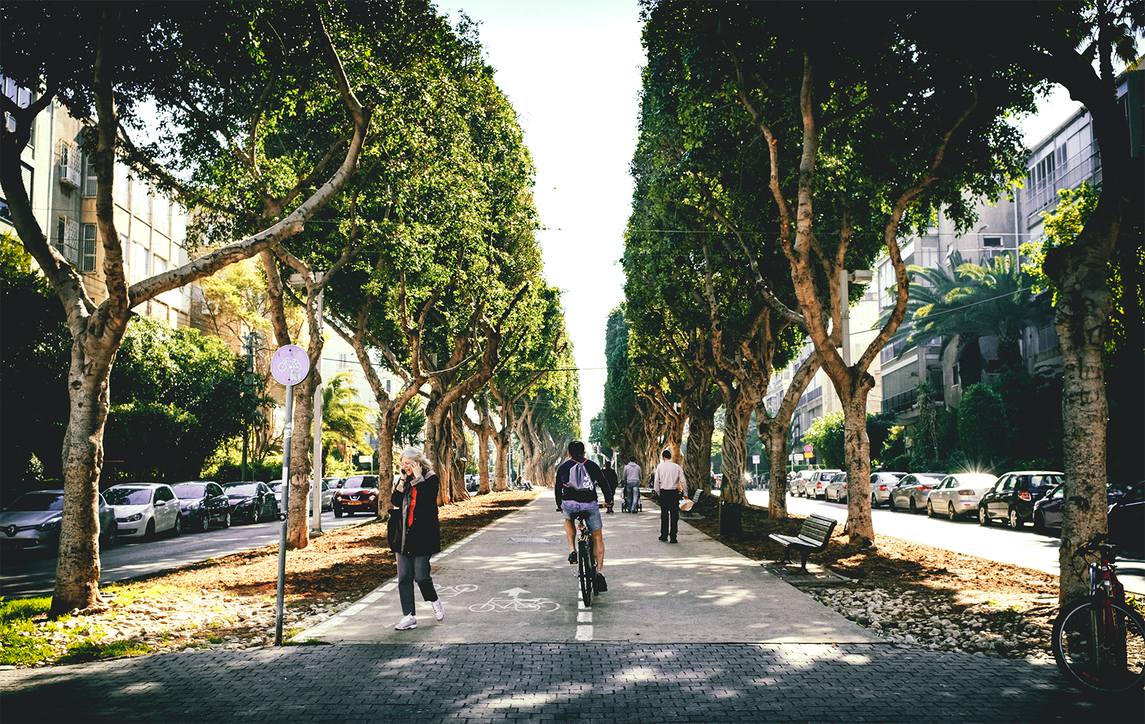Local Guide

THROUGH THE DESIGNER'S EYES: Tel Aviv
Where do you live? How would you describe the creative scene in your city?
I live in Tel Aviv, which is a city erupting with life. Tel Aviv in general has turned into a real social hub. It’s flourishing in many cultural aspects and creativity is a part of this process.
How long have you lived here?
I first moved to Tel Aviv from the Kibbutz when I was 18. Until the age of 25 I moved in and out of the city before settling here once and for all.

Is there a large design community in your city? How do you interact with it?
Despite the fact that Tel Aviv is a small city, it has a bustling design scene that is quickly growing. I regularly collaborate with graphic designers, stylists, and artists from different medias; I also host designers in my studio.
How does the city inspire you?
When you live in a place, you react to it, so naturally much of the brand essence is drawn from Tel Aviv. Tel Aviv is very instinctual and raw, it is immediate, exposed, vivid, and improvised. I like to absorb all of that energy and bring it together into action. On the other hand, my mind can go beyond my geographical settings; other things impact the sensibility of my work and the way in which I interact with it.
What makes your city special?
Tel Aviv is a cool city with a unique vibe, attracting many people both locally and from abroad. It is largely considered a safe city for residents and visitors alike, while having the possibility to emphasize individuality in a social community and the conflict of being seen and unseen in a vibrant city life.

What do you love most about your city?
I like the diversity and the edginess of it, the fact that there is no clear demography. The endless possibilities of finding your place within.
What cuisines are distinct to your city?
We have a rich culinary scene based on ethnic food. Lately, the street food has grown to be quite popular as well!
What's a typical day like for you?
I wake up every morning at 6:30AM. I send the kids to school and head to the studio until noon. I then go back to welcome the kids home from school and spend the day with them.
Where is the best place to stay? Eat, drink, and decompress?
I like to spend time at the beach. It’s always available and a great way for escapism in the heart of the city.

What's the biggest misconception people have about your city?
That it is the capital of Israel.
How does the culture in your city impact your designs?
I work a lot with text, geometric forms, and shapes of basic clothing items, and deal with this through blurriness of gender characteristics to design a poetic collection for the costumer. My clothes always leave a space for the wearer to cast his their own identity into it. Identity in general interests me, how we communicate in the world, and the contradictions of our personal layers, and I find this content to be relevant in many different social and political situations beyond fashion.
How does the fashion scene function within your local culture?
As there is a lack of means and very limited support in the fashion industry in Israel, and a strong awareness for mostly global brands, I strive to transform the surreal Israeli reality into a state of a dream. I create a casual and highly wearable style, but with a strong emphasis on contemporary individualism. I make clothes that are mostly unisex.

How has your city changed in the past few years? How have these changes impacted your designs?
For the past few years, the fashion scene in Tel Aviv has grown tremendously, and it strives to align with the global fashion industry. I always aim to expand my impact while listening to my past and present. Ultimately, it is not about the design, but rather about the wearer’s encounter with the clothes.
Looking at your business and the changing landscape, will it be sustainable to stay in your city for the long term?
The brand Roni Bar was established in 2000, and brought with it a new state of mind to the fashion scene in Tel Aviv, while addressing individualism within the urban landscape. I wish to continue producing locally as well internationally; I also hope to continue working in a way that allows the clothes to evolve and serve as their own power of change.
Do you think inspiration is tied to the physicality of a place or is it something greater? How about in your city specifically?
The passion for expression and the desire to create an alternative dialogue, one that goes beyond the conventional, daily and accepted means of communication. I let myself be influenced by social criticism and I’m drawn to create cultural commentary through fashion. I try to stay connected to my processes and hope that my clothes will speak beyond the stereotype, perhaps even break it.













